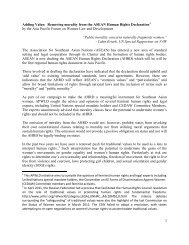A Digest of Case Law on the Human Rights of Women - Asia Pacific ...
A Digest of Case Law on the Human Rights of Women - Asia Pacific ...
A Digest of Case Law on the Human Rights of Women - Asia Pacific ...
You also want an ePaper? Increase the reach of your titles
YUMPU automatically turns print PDFs into web optimized ePapers that Google loves.
CEDAW Country Ratificati<strong>on</strong> Report<br />
India<br />
Ratificati<strong>on</strong><br />
The Government <str<strong>on</strong>g>of</str<strong>on</strong>g> India signed CEDAW <strong>on</strong> 30 July 1980 and ratified it <strong>on</strong> 9 July<br />
1993, so<strong>on</strong> after <strong>the</strong> World C<strong>on</strong>ference <strong>on</strong> <strong>Human</strong> <strong>Rights</strong> in Vienna in 1993.<br />
Declarati<strong>on</strong>s<br />
The Government modified its obligati<strong>on</strong>s in relati<strong>on</strong> to Articles 5(a), 16(1) and 16(2)<br />
<str<strong>on</strong>g>of</str<strong>on</strong>g> <strong>the</strong> C<strong>on</strong>venti<strong>on</strong> with two declarati<strong>on</strong>s. First, in relati<strong>on</strong> to Articles 5(a) and 16(1)<br />
it declared that it would c<strong>on</strong>tinue to abide by its policy <str<strong>on</strong>g>of</str<strong>on</strong>g> n<strong>on</strong>-interference in <strong>the</strong><br />
pers<strong>on</strong>al affairs <str<strong>on</strong>g>of</str<strong>on</strong>g> any community without its initiative and c<strong>on</strong>sent.<br />
Sec<strong>on</strong>d, in relati<strong>on</strong> to Article 16(2) <strong>the</strong> Government declared that although in<br />
principle it fully supports <strong>the</strong> principle <str<strong>on</strong>g>of</str<strong>on</strong>g> compulsory registrati<strong>on</strong> <str<strong>on</strong>g>of</str<strong>on</strong>g> marriages, it<br />
is not practical to enforce it in a vast country like India where <strong>the</strong>re are variety <str<strong>on</strong>g>of</str<strong>on</strong>g><br />
customs, religi<strong>on</strong>s and differing levels <str<strong>on</strong>g>of</str<strong>on</strong>g> literacy.<br />
Reservati<strong>on</strong>s<br />
The Government declared that it was not bound by Paragraph 1 <str<strong>on</strong>g>of</str<strong>on</strong>g> Article 29 <str<strong>on</strong>g>of</str<strong>on</strong>g> <strong>the</strong><br />
C<strong>on</strong>venti<strong>on</strong>.<br />
Impact<br />
CEDAW’s impact is evident in <strong>the</strong> legislative changes and <strong>the</strong> legal challenges being<br />
made in <strong>the</strong> Indian courts. After signing <strong>the</strong> C<strong>on</strong>venti<strong>on</strong> but prior to its ratificati<strong>on</strong><br />
<strong>the</strong> Citizenship Act 1955 was amended in 1986 with <strong>the</strong> express purpose <str<strong>on</strong>g>of</str<strong>on</strong>g> making<br />
it c<strong>on</strong>sistent with <strong>the</strong> C<strong>on</strong>venti<strong>on</strong>’s provisi<strong>on</strong>s <strong>on</strong> citizenship. As a result <str<strong>on</strong>g>of</str<strong>on</strong>g> <strong>the</strong><br />
amendment, all citizens regardless <str<strong>on</strong>g>of</str<strong>on</strong>g> sex, can c<strong>on</strong>fer citizenship <strong>on</strong> <strong>the</strong>ir children<br />
and foreign spouses removing <strong>the</strong> discriminati<strong>on</strong> that had previously existed between<br />
male and female citizens.<br />
In 1997 after <strong>the</strong> ratificati<strong>on</strong> <str<strong>on</strong>g>of</str<strong>on</strong>g> CEDAW, <strong>the</strong> Supreme Court <str<strong>on</strong>g>of</str<strong>on</strong>g> India applied General<br />
Recommendati<strong>on</strong> 19 to lay down guidelines relating to sexual harassment in <strong>the</strong><br />
workplace in <strong>the</strong> case <str<strong>on</strong>g>of</str<strong>on</strong>g> Vishaka v State <str<strong>on</strong>g>of</str<strong>on</strong>g> Rajasthan 1997 6 Supreme Court <str<strong>on</strong>g>Case</str<strong>on</strong>g>s<br />
241. According to <strong>the</strong> Court <strong>the</strong> absence <str<strong>on</strong>g>of</str<strong>on</strong>g> law <strong>on</strong> this issue, despite <strong>the</strong> State’s<br />
undertaking to eliminate discriminati<strong>on</strong>, amounted to discriminati<strong>on</strong> against women.<br />
Hence, guidelines <strong>on</strong> law <strong>on</strong> sexual harassment in <strong>the</strong> workplace came into being<br />
through judicial activism, with directi<strong>on</strong>s to <strong>the</strong> legislature to enact a law.<br />
The Indian women’s movement c<strong>on</strong>tinues to debate and challenge <strong>the</strong> Government’s<br />
policy <str<strong>on</strong>g>of</str<strong>on</strong>g> n<strong>on</strong>-interference with religious-based family laws and <strong>the</strong> two declarati<strong>on</strong>s<br />
and reservati<strong>on</strong> in relati<strong>on</strong> to <strong>the</strong> C<strong>on</strong>venti<strong>on</strong>. They argue that religious-based family<br />
laws disadvantage women in different ways and a policy <str<strong>on</strong>g>of</str<strong>on</strong>g> n<strong>on</strong>-interference by <strong>the</strong><br />
102



